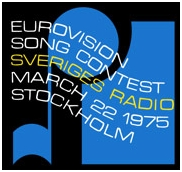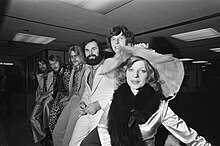Eurovision Song Contest 1975
| Eurovision Song Contest 1975 | |
|---|---|
 | |
| Dates | |
| Final | 22 March 1975 |
| Host | |
| Venue | Stockholmsmässan Stockholm, Sweden |
| Presenter(s) | Karin Falck |
| Musical director | Mats Olsson |
| Executive supervisor | Clifford Brown |
| Host broadcaster | Sveriges Radio (SR) |
| Website | eurovision |
| Participants | |
| Number of entries | 19 |
| Debuting countries | |
| Returning countries | |
| Non-returning countries | |
| |
| Vote | |
| Voting system | Each country awarded 12, 10, 8-1 points to their 10 favourite songs |
| Winning song | "Ding-a-dong" |
The Eurovision Song Contest 1975 was the 20th edition of the contest hosted by Sveriges Radio (SR) and held in Stockholm, Sweden. The arena for the event was the newly built Stockholmsmässan in Älvsjö in southern Stockholm. ABBA's victory in Brighton the previous year gave Sweden the right to host the contest for the first time. The Contest was won by Teach-In, who sang "Ding-a-dong" in English, representing the Netherlands.[1]
Location

The contest took place in Stockholm, the capital and largest city of Sweden, which has long been one of the country's cultural, media, political, and economic centres as well as the most populated urban area in Scandinavia.[2][3]
The venue for the contest was Stockholmsmässan (or Stockholm International Fairs in English). The main building is in Älvsjö – a southern suburb of Stockholm Municipality for which the building got its nickname. It was constructed in 1971 and holds 4,000 people.
Format
This year a new scoring system was implemented. Each country would be represented by a jury of 11 members, at least half of whom had to be under the age of 26. Each jury member had to award every song a mark of between 1 and 5 points, but could not vote for their own nation's entry. The votes were cast immediately after the song was performed and collected by the adjudicator straight away. After the last song was performed, the jury secretary added up all the votes cast and awarded 12 points to the song with the highest score, 10 to the second highest score, then 8 to the third, 7 to the fourth, 6 to the fifth and so forth down to 1 point for the song ranked 10th. The jury spokesperson then announced the ten scores in the order the songs were presented when called upon by the hostess. The hostess Karin Falck several times confused the new system with questions like "How much is seven in France?"
Unlike today, the points were not given in order (from 1 up to 12), but in the order the songs were performed. The current procedure of announcing the scores in ascending order, beginning with 1 point, was not established until 1980. This scoring system remained in use until 1996, although the number of jurors varied (it was 11 from 1975 to 1987, and 16 from 1988 to 1997) and the scores they awarded each song increased to 10 rather than 5. In from 1997, some juries were replaced by televotes and from 1998, all countries were encouraged to televote when possible.
In the 2009 final and the 2010 semi-finals, the juries were reintroduced to provide 50% of the scores. Despite these changes in how the points were decided, the 'douze points' scoring system remained in place from 1975–2015. In 2016 it was altered to each country providing two separate sets of points, however, modelled after the former model.[4]
Participating countries

Greece withdrew from this contest in response to the 1974 Turkish invasion of Cyprus, in protest of Turkey's participation. Despite this, a record of nineteen countries took part. Turkey made their début, while France and Malta returned to the contest.[1]
The Portuguese entry "Madrugada" was an unabashed celebration of the Carnation Revolution, during which the country's 1974 Eurovision entry had played a pivotal practical role. According to author and historian John Kennedy O'Connor in his book The Eurovision Song Contest – The Official History, the Portuguese performer had to be dissuaded from wearing his Portuguese army uniform and carrying a gun onto the stage.[5] Some competitors (notably Portugal and Yugoslavia) opted to perform their songs in English for the rehearsals heard by the judges, but in their native tongue at the final. Others, such as Belgium and Germany, opted for a mix of their own language and English.
Conductors
Each performance had a conductor who maestro the orchestra.[6]
 Netherlands - Harry van Hoof
Netherlands - Harry van Hoof Ireland- Colman Pearce
Ireland- Colman Pearce France - Jean Musy
France - Jean Musy Germany - Rainer Pietsch
Germany - Rainer Pietsch Luxembourg - Phil Coulter
Luxembourg - Phil Coulter Norway - Carsten Klouman
Norway - Carsten Klouman Switzerland - Peter Jacques
Switzerland - Peter Jacques Yugoslavia - Mario Rijavec
Yugoslavia - Mario Rijavec United Kingdom - Alyn Ainsworth
United Kingdom - Alyn Ainsworth Malta - Vince Tempera
Malta - Vince Tempera Belgium - Francis Bay
Belgium - Francis Bay Israel - Eldad Shrim
Israel - Eldad Shrim Turkey - Timur Selçuk
Turkey - Timur Selçuk Monaco - André Popp
Monaco - André Popp Finland - Ossi Runne
Finland - Ossi Runne Portugal - Pedro Osório
Portugal - Pedro Osório Spain - Juan Carlos Calderón
Spain - Juan Carlos Calderón Sweden - Lars Samuelson
Sweden - Lars Samuelson Italy - Pier Natale Massara
Italy - Pier Natale Massara
Returning artists
Norway's Ellen Nikolaysen was the only participant to return to the contest this year. Ellen's previous participations where with the band Bendik Singers in 1973.[1]
Results
Scoreboard
12 points
Below is a summary of all 12 points in the final:
| N. | Contestant | Voting nation |
|---|---|---|
| 6 | Netherlands | Israel, Malta, Norway, Spain, Sweden, United Kingdom |
| 4 | United Kingdom | France, Luxembourg, Monaco, Yugoslavia |
| 2 | Finland | Germany, Switzerland |
| France | Ireland, Portugal | |
| 1 | Ireland | Belgium |
| Italy | Finland | |
| Luxembourg | Netherlands | |
| Portugal | Turkey | |
| Switzerland | Italy |
International broadcasts and voting
The table below shows the order in which votes were cast during the 1975 contest along with the spokesperson who was responsible for announcing the votes for their respective country. Each national broadcaster [with the exception of Israel] also sent a commentator to the contest, in order to provide coverage of the contest in their own native language. Details of the commentators and the broadcasting station for which they represented are also included in the table below.[1]
Non-participating countries
 Austria - Ernst Grissemann (FS2)
Austria - Ernst Grissemann (FS2) Denmark - Claus Toksvig (DR TV)
Denmark - Claus Toksvig (DR TV) Greece - Mako Georgiadou (ERT)
Greece - Mako Georgiadou (ERT) Iceland - Dóra Hafsteinsdóttir (Sjónvarpið)[21]
Iceland - Dóra Hafsteinsdóttir (Sjónvarpið)[21]
Notable incidents
Intelligence reports at the time pointed out the festival as a possible target for a terrorist attack by the Red Army Faction which forced the organizers to tighten security considerably. The attack struck the West German embassy in Stockholm instead about a month later (see West German embassy siege).
The Swedish left movement protested against the contest and its commercial aspect. At first the criticism was directed towards SR for the huge amount of money they spent on the contest but soon the protests developed into a movement against commercial music overall. When the Eurovision Song Contest took place an alternative festival was organized in another part of Stockholm where anybody who wanted could perform a song. Most popular became Sillstryparn's entry "Doing the omoralisk schlagerfestival" (Doing the immoral Eurovision festival). In the autumn of 1975 SR informed that Sweden would not participate in the 1976 edition of the Eurovision Song Contest due to the high costs that came with hosting the show. The rules later changed so that the costs were split more equally between the participating broadcasters. In the end, SR did not broadcast the 1976 Contest.
Swedish TV technicians refused to broadcast the festival to Chile, where Canal 13 (an associate member of the EBU) had plans to air it. The refusal was in protest to the military dictatorship that has been ruling the country since the 1973 Chilean coup d'etat led by Augusto Pinochet.[22]
References
- ^ a b c d "Eurovision Song Contest 1975". European Broadcasting Union. Retrieved 10 July 2012.
- ^ "Tätorter 2010" (PDF) (in Northern Sami). Statistics Sweden. Retrieved 16 June 2011.
{{cite web}}: External link in|publisher= - ^ "Byopgørelsen 1. januar 2010" (PDF). Retrieved 3 June 2011.
- ^ Dahlander, Gustav. "SVT bakom historisk förändring inför Eurovision Song Contest i Stockholm 2016".
- ^ O'Connor, John Kennedy. The Eurovision Song Contest – The Official History. Carlton Books, UK. 2007 ISBN 978-1-84442-994-3
- ^ "Conductors 1975". 4Lyrics.com. Retrieved 10 July 2012.
- ^ "Eurovision Song Contest 1975". The Diggiloo Thrush. Retrieved 4 March 2012.
- ^ "Nederlandse televisiecommentatoren bij het Eurovisie Songfestival". Eurovision Artists (in Dutch).
- ^ a b Christian Masson. "1975 – Stockholm". Songcontest.free.fr. Retrieved 10 August 2012.
- ^ "Eurovision Song Contest 1975". Ecgermany.de. Retrieved 10 August 2012.
- ^ a b Dyrseth, Seppo (OGAE Norway)
- ^ Baumann, Peter Ramón (OGAE Switzerland)
- ^ "Grand Final: 1975, Eurovision Song Contest". BBC.
- ^ Roxburgh, Gordon (2014). Songs For Europe – The United Kingdom at the Eurovision Song Contest Volume Two: The 1970's. UK: Telos Publishing. p. 182. ISBN 978-1-84583-065-6.
- ^ Richard Astbury's commentary was not broadcast – his apologies to BFBS listeners due to 'technical difficulties' are conveyed by Terry Wogan in his BBC Radio 2 commentary which was the commentary broadcast by BFBS. http://www.qa-show.com/wiki/20514
- ^ "פורום אירוויזיון". Sf.tapuz.co.il. 13 September 1999. Archived from the original on 8 October 2011. Retrieved 10 August 2012.
{{cite web}}: Unknown parameter|deadurl=ignored (|url-status=suggested) (help) - ^ a b "Selostajat ja taustalaulajat läpi vuosien? • Viisukuppila". Viisukuppila.fi. Retrieved 10 August 2012.
- ^ "Comentadores Do ESC – escportugalforum.pt.vu | o forum eurovisivo português". 21595.activeboard.com. Archived from the original on 21 April 2012. Retrieved 10 August 2012.
{{cite web}}: Unknown parameter|deadurl=ignored (|url-status=suggested) (help) - ^ "FORO FESTIVAL DE EUROVISIÓN • Ver Tema – Uribarri comentarista Eurovision 2010". Eurosongcontest.phpbb3.es. Archived from the original on 17 March 2012. Retrieved 10 August 2012.
{{cite web}}: Unknown parameter|deadurl=ignored (|url-status=suggested) (help) - ^ a b c "Infosajten.com". Infosajten.com. Archived from the original on 18 July 2012. Retrieved 10 August 2012.
{{cite web}}: Unknown parameter|deadurl=ignored (|url-status=suggested) (help) - ^ Háskólabókasafn, Landsbókasafn Íslands -. "Timarit.is". timarit.is.
- ^ "Geopolitics of Eurovision: Chile Edition". CommoditiesControl. 5 May 2015. Retrieved 6 May 2017.
External links

